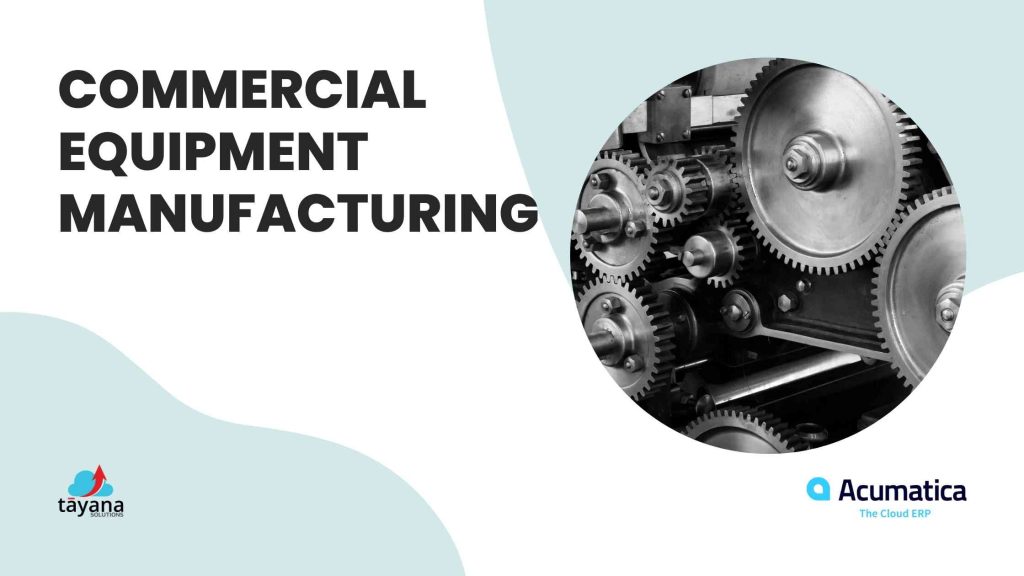Manufacturers face numerous challenges in today’s fast-paced business environment, including increasing competition, global supply chain complexities, and rapidly evolving customer demands. Commercial equipment manufacturers, in particular, are tasked with delivering high-quality products while ensuring operational efficiency, cost control, and timely delivery. Many manufacturers are adopting cloud-based Enterprise Resource Planning (ERP) solutions to overcome these challenges and drive innovation. This article explores the significance of cloud ERP in the context of commercial equipment manufacturing and highlights the key benefits it offers.
Understanding Commercial Equipment Manufacturing:
Commercial equipment manufacturing involves producing machinery, tools, and equipment across various industries, including construction, agriculture, healthcare, transportation, and more. These manufacturers face unique challenges, such as managing complex bills of materials (BOMs), optimizing production schedules, ensuring regulatory compliance, and maintaining consistent product quality. The adoption of cloud ERP systems addresses these challenges and unlocks several advantages.
Cloud ERP is a software solution that integrates core business processes, including inventory management, production planning, procurement, sales, and finance, into a unified platform hosted on the cloud. Unlike traditional on-premises ERP systems, cloud ERP offers several distinct advantages: scalability, accessibility, flexibility, and cost-effectiveness.
Key Benefits of Cloud ERP in Commercial Equipment Manufacturing:
Enhanced Supply Chain Management:
Cloud ERP streamlines supply chain operations by providing real-time visibility into inventory levels, order status, and supplier performance. Manufacturers can make informed decisions regarding procurement, demand forecasting, and inventory optimization with accurate data. It ensures that the right parts and materials are available at the right time, minimizing production delays and reducing carrying costs.
Improved Production Planning and Scheduling:
Efficient production planning and scheduling are critical for commercial equipment manufacturers to meet customer demands and optimize resource utilization. Cloud ERP systems enable manufacturers to create dynamic production schedules, considering machine availability, labor capacity, and material availability. Real-time updates and alerts ensure timely adjustments, preventing bottlenecks and improving production efficiency.
Quality Management and Compliance:
Ensuring product quality and adhering to industry-specific regulations are paramount in commercial equipment manufacturing. Cloud ERP provides robust quality management features, allowing manufacturers to define quality control parameters, conduct inspections, track non-conformances, and manage corrective actions. Moreover, cloud ERP facilitates compliance with regulatory requirements, reducing the risk of penalties and recalls.
Enhanced Collaboration and Communication:
Cloud ERP fosters collaboration across departments and geographically dispersed teams. With a centralized system, stakeholders can seamlessly access real-time data, share information, and collaborate on projects. It enables effective communication, faster decision-making, and smoother coordination among engineering, production, sales, and service teams, improving customer satisfaction.
Business Intelligence and Analytics:
Cloud ERP systems offer advanced reporting and analytics capabilities, empowering commercial equipment manufacturers with actionable insights. Manufacturers can identify trends, analyze operational performance, and make data-driven decisions by leveraging real-time data. Business intelligence tools embedded in cloud ERP systems enable manufacturers to monitor key performance indicators (KPIs) such as on-time delivery, production yield, and profitability, facilitating continuous improvement initiatives.
Critical Considerations for Cloud ERP Adoption:
While cloud ERP offers numerous benefits, successful implementation requires careful planning and consideration. Here are a few critical concerns for commercial equipment manufacturers:
Data Security and Privacy:
Choose a cloud ERP provider with robust data security measures, including encryption, regular backups, and access controls. Compliance with information privacy rules, such as GDPR or CCPA, is crucial to protecting sensitive customer and operational data.
Scalability and Customization:
Ensure the chosen cloud ERP solution can scale with your business growth and accommodate future requirements. Flexibility in customizing workflows, reports, and user interfaces is essential to align the system with your specific manufacturing processes.
Integration Capabilities:
Verify that the cloud ERP system can seamlessly integrate with other critical software applications, such as CRM systems, supply chain tools, and business intelligence platforms. The integration enables data flow across systems, eliminating data silos and enabling a holistic business view.
In the rapidly evolving landscape of commercial equipment manufacturing, adopting cloud ERP systems has become increasingly crucial for staying competitive and achieving operational excellence. Cloud ERP enhances supply chain management, production planning, quality control, collaboration, and business intelligence, empowering manufacturers to drive efficiency, optimize resources, and meet customer expectations. By embracing cloud ERP, commercial equipment manufacturers can navigate challenges, unlock growth opportunities, and stay ahead in the dynamic global marketplace.

Vijay comes with a vast experience in ERP and enterprise solutions space with about 20 years of experience in various packaged application like Acumatica, SAP, Orion, Salesforce.com, SugarCRM and, SalesLogix.

